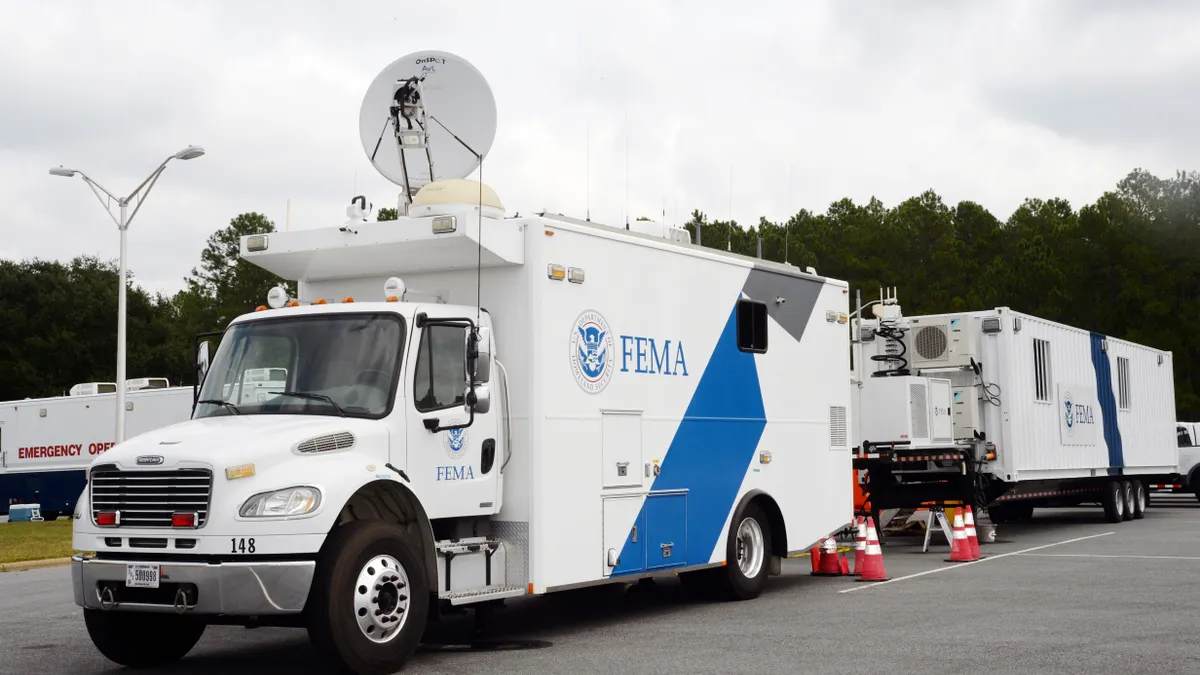Dive Brief:
- The Federal Emergency Management Agency has created a five-year voluntary agreement with the private sector under the Defense Production Act for the manufacture and distribution of "critical healthcare resources" necessary for the U.S. to respond to a pandemic, including medical devices.
- A Federal Register notice published Monday provided text of the voluntary DPA agreement that establishes a committee, chaired by the agency, meant to provide a forum for the nationwide "coordination, planning, identification and development" of health and medical supplies.
- FEMA in May held a virtual meeting on the proposed agreement where AdvaMed urged the agency to include it as a party. However, a FEMA spokesperson said the agency "will be inviting any relevant organizations to join the voluntary agreement, and any supporting subcommittees, at the appropriate time."
Dive Insight:
Faced with medical supply chain shortages amid the coronavirus pandemic, FEMA said it developed the voluntary agreement under Section 708 of the Defense Production Act of 1950 to create "unity of effort" between the federal government and the private sector in maximizing the effectiveness of the manufacture and distribution of critical healthcare resources.
The Korean War-era law's voluntary agreement clause allows private companies to enter into pacts with the government on mutually acceptable terms and gain immunity from antitrust liability. The agreements go into effect once they are signed by the invited participants who may withdraw "at any point, subject to the fulfillment of obligations," according to FEMA.
Based on stakeholder feedback, FEMA has adopted a two-part structure for the voluntary DPA agreement: The creation of a Committee for the Distribution of Medical Resources Necessary to Respond to a Pandemic that will include representatives from stakeholders involved with the distribution or manufacturing of these critical supplies; and the possible formation of subcommittees to carry out specific plans of action targeting particular medical items.
"This structure helps balance the broad participation from stakeholders with the agency's need to keep certain actions narrowly tailored to respond quickly during an emergency. In addition, allowing a separate 'sign-on' at the plan of action level will allow participants to review all relevant information, including the scope of the requested work and information, prior to commitment. And it allows the participants to commit to some, but not all, actions taken under the agreement," said the FEMA spokesperson.
At FEMA's May meeting, AdvaMed pitched itself as an association that could "facilitate communication" between the federal government and medtech companies as part of the voluntary DPA agreement, serving as a "clearing house or a hub" and providing the agency with "greater visibility to new COVID-19 technologies coming on the market and critical to this fight."
For now, however, FEMA is keeping mum on whom it intends to invite to participate in the agreement. According to Monday's Federal Register notice, the agency is considering individuals, partnerships, corporations, associations and private organizations that have "substantive capabilities, resources or expertise" to carry out the agreement's intended purpose.
"FEMA plans to invite organizations which provide essential health and medical resources necessary to respond to a pandemic to participate in the agreement, including, but not limited to, personal protective equipment, pharmaceuticals, respiratory devices, vaccines, raw materials, supplies, and medical devices," said an agency spokesperson.
AdvaMed declined to comment on FEMA's voluntary DPA agreement released on Monday. However, in March the medtech group sent a letter to FEMA asking for the designation of a single agency to make ventilator allocation decisions in the face of "unprecedented demand" for the potentially life-saving devices.











